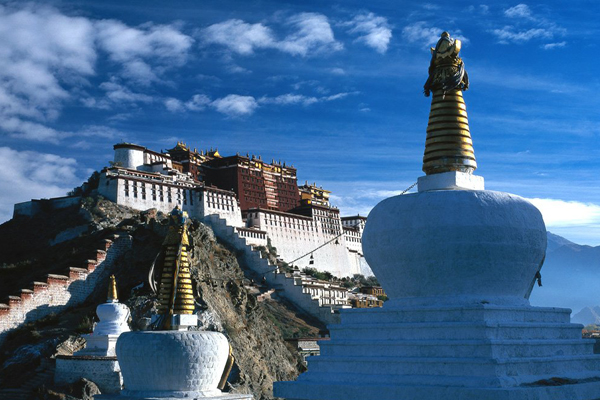
Thriving tourism industry has greatly accelerated Lhasa's regional economy. [Photo/ Baidu]
Neither the biggest nor the richest city in China, Lhasa, capital city of Tibet, was named the "City with Happiest People" among the 31 Chinese capital cities in a survey by the China Central TV station in 2011.
The result made many surprised and confused. As we all know, sitting in the Qinghai-Tibet Plateau with severe cold and low oxygen content, Lhasa not only economically lags far behind other inland cities in China but still has to partly rely on the financial and technical support from the Central Government and other inland provinces and cities in the course of development.
If you have a chance to read tourism guide books about China, you may find the answer. Lhasa, dubbed as "pearl of the Qinghai-Tibet plateau", is always among the highest ranking of recommendation. As some experts may suggest, the thriving tourism industry, which has greatly accelerated its regional economy may be one of the reason.
A man's getting-rich story: about tourism

A photographer is taking photo in Tibet. [Photo/iphoto.blog.163.com]
In the Tingri County of Shigatse Prefecture, when mentioning tourism, people have to talk about Tsering Dunzhun, a former postman, who started his business with only five hundred yuan and got rich.
Tingri County is the gateway for travelers to Mt. Qomolangma. In the 1980s, Tsering Dunzhun found that there were many tourists pouring into his birth place Zhaxizhong Village for a glimpse of the splendid mountain. Seeing the business opportunity, he opened a small family-style teashop.
In 1994, as more tourists came, Tsering turned his teashop into a home inn, the first of its kind in Tingri County, which brought in for him an annual income of 10,000 yuan.
In 1999, Tsering invested around 350,000 yuan in refurbishing and expanding his home inn-the current Banda Inn. With the blooming tourism, Tsering has become a millionaire.
Inspired by Tsering, many villagers started to run home inns, offering services for travelers. So far, there are 37 home inns at different levels in Tingri County and 57 seasonal tent-style hotels at the base camp of Mt.Qomolangma.
With the development of the society, more Tibetans came to realize that tourism could be one of the ways to improve their living standard.
At present, the number of local Tibetans who engage in tourism stands at 48,000 with a per capita income of 6,118 yuan and the number is expected to reach 100,000 by the end of 2015.
In social psychological terms, there exists a positive correlation between people's income and sense of happiness when the income is able to help them shake off poverty. In other words, the sense of happiness gets strongest when the people's living standard improved dramatically.
